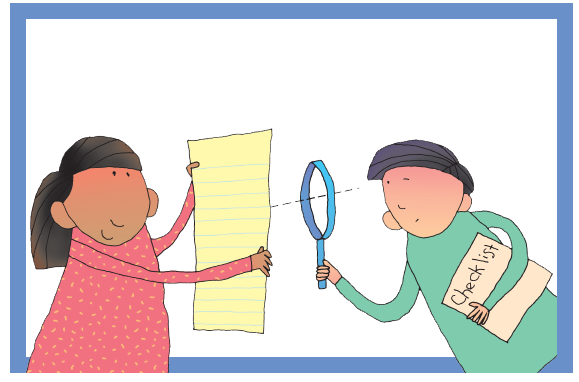In the past, teachers did all of the writing assessment, but now we recognize that students who learn to assess writing become better writers. They discover the difference between writing that works and writing that doesn't. They also learn to think like professional writers and take responsibility for their own revising.
To become effective assessors, students can. . .
- learn about the qualities of effective writing.
- use the qualities to understand their goals for writing.
- use the qualities to evaluate their own work throughout the writing process.
- compile a portfolio of their work and complete a portfolio evaluation.
- use the qualities to evaluate the writing of their peers during revising and editing.
- assess and discuss written work that the teacher shares with the class.
A Community of Writers
Having students become assessors of writing also helps create a writing community in your classroom. Writers need to talk with other writers. They need to know that other working writers are available to help. That’s why it’s important that your students share their work throughout the writing process. They need to feel that they are among writing colleagues—all committed to helping each other improve.
The exchange of ideas among fellow writers is especially important once students have produced a first or second draft of their work. Students get so close to their writing that they can’t always evaluate it objectively. They need fellow writers to offer encouragement, ask questions, and make suggestions.
Evaluations Throughout the Process
Students can perform formative evaluations throughout the writing process on their own work and the work of peers:
- Students can evaluate their own work using a student checklist or an editing checklist.
- Students can evaluate peer's work formatively using a simple response sheet or a detailed response sheet.
- Students can also summatively evaluate their own work using a mode-specific rubric for narrative, explanatory, persuasive, book review, or research writing.
- You should avoid having students summatively evaluate the work of classmates, which creates an adversarial environment that is destructive to the writing community.
For English Language Learners (ELLs) Peer evaluation should be reserved for advanced ELL writers. Intermediate students will be most comfortable in a writing circle that includes both experienced and less experienced writers—so they can gradually assume evaluating skills.
